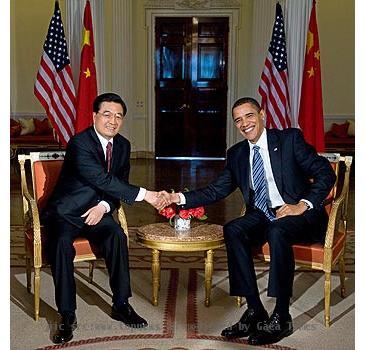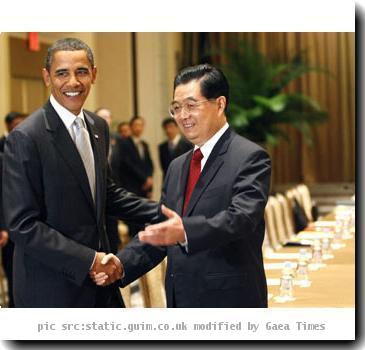Brazil: ‘Affinity’ on Iran nuclear question with China, India
By Bradley Brooks, APThursday, April 15, 2010
Brazil: ‘Affinity’ on Iran with China, India
BRASILIA, Brazil — There is an “affinity” between Brazil’s opposition to new sanctions on Iran and the positions of China and India, the Brazilian foreign minister said as leaders of those nations met Thursday.
Brazil has increased its political and economic ties to Iran in the past year while frequently criticizing efforts to impose sanctions over its nuclear program.
Brazilian Foreign Minister Celso Amorim said President Luiz Inacio Lula da Silva met with Chinese and Indian leaders on the sidelines of a summit of the so-called BRIC nations, which also includes Russia.
“We saw a great affinity of views from both,” Amorim said. “There was an exchange of ideas on how to start the process, what is the best way to find a peaceful solution” to international concern about Iran’s development of nuclear energy.
The U.S. and its allies accuse Iran of seeking to build a nuclear weapon, a claim Iran denies.
China and Russia, as part of the U.N. Security Council, have the most clout among BRIC nations in shaping a global response to Iran.
On Thursday at the United Nations, leading powers met to discuss possible new sanctions against Iran. Chinese diplomats said their position was to focus on diplomacy.
Chinese president Hu Jintao made no statements in Brasilia about Iran. But Amorim said after Silva met with Hu and Indian Prime Minister Manmohan Singh that the Brazil delegation was optimistic.
“Our belief is that there is still the possibility” for a negotiated agreement, he said, adding that China and India seem to believe that “the effectiveness of the sanctions is questionable and that sanctions affect only the most vulnerable people and not the leaders.”
The summit was cut short because China’s Hu said he would return home early due to earthquakes that killed at least 600 people. That meant he was canceling visits to Venezuela and Chile.
At the summit’s close, leaders of the four nations announced they had signed an agreement to deepen cooperation among their countries’ development banks. They said China would host the next BRIC summit next year.
The BRIC nations are looking to deepen their trade ties and are calling for a bigger role in major global financial decisions, primarily within institutions such as the International Monetary Fund.
Following a bilateral meeting with Hu, Silva said that because of the economic advances of Brazil and China, “We have the means — and obligation, really — of fighting for a different financial order.”
Also on Thursday, the fledgling political club known as IBSA, which comprises Brazil, India and South Africa, convened its fourth annual meeting.
Leaders from the three nations met with Palestinian Foreign Minister Riad Malki and called for the resumption of peace talks with Israel that would “lead to a two-state solution” with East Jerusalem as the shared capital.
Associated Press writers Marco Sibaja and Edith M. Lederer at the United Nations contributed to this report.
Tags: Asia, Brasilia, Brazil, China, East Asia, Foreign Policy, Greater China, Hu Jintao, India, Iran, Latin America And Caribbean, Manmohan Singh, Middle East, South America, South Asia, Summits

